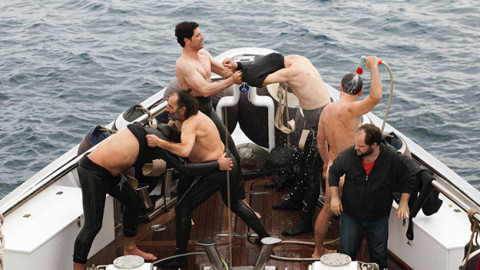Film of the Week: Chevalier
This week’s suggested subject for further study: unlikely feel-good moments in art cinema. The topic comes to mind partly because of this year’s transcendent moment of joy in Cannes, the scene in Maren Ade’s Toni Erdmann in which an uptight young corporate woman is persuaded by her father to sing Whitney Houston’s “The Greatest Love of All” at a party and ends up pouring her entire soul into it. Toni Erdmann, admittedly, is anything but a bleak, demanding art film, but the example demonstrates how all cinema, not just the mainstream variety that depends on gratifying our sentiment, can benefit from a little straight-down-the-line emotional release from time to time.
I’m also thinking of the dizzy, fizzy disco number that accompanies the communal exercise routine in a park at the end of Apichatpong Weerasethakul’s Syndromes and a Century, which sends you out grinning even if you’ve previously been scowling with perplexity. And here’s another example, in the otherwise somber Greek comedy Chevalier: the magically incongruous moment when a short, fat, balding man perplexes his shipmates by doing a perfect lip-synching routine to Minnie Riperton’s soul coloratura ballad “Loving You,” complete with fireworks display and capped by an insouciant cartwheel.
But you possibly expect a moment of strangeness like this from writer-director Athina Rachel Tsangari. She was the creator of the extravagantly eccentric, rigorously modernist (in a detached, neo-Antonioni-esque way) Attenberg (10), a film about family, social bonds, ritual, and dance-like physical contortions. Tsangari is also known as producer of Yorgos Lanthimos’s films (Kinetta, Dogtooth, Alps), which have tended to deal with similar themes. The two directors’ films have generally born some family resemblance, although Lanthimos arguably capsized into self-parody on last year’s awkward, internationally cast, English-language The Lobster. Tsangari’s Chevalier, however, retains a sobriety and economy that makes it cut deeper than the absurdist lark it might have been.
Chevalier takes place almost entirely on a compact but luxurious yacht on the Aegean sea. Its characters are the six men holidaying on board, out on a fishing trip; the captain and two male cooks are also seen from time to time, the latter two eventually offering an ironic counterpart, or sometimes chorus, to what’s happening on deck level. The vessel has been chartered, one assumes, by the patriarch among the men, an older, solemn figure known as “the Doctor” (Yorgos Kendros). Also on board are his son-in-law Yannis (Yorgos Pirpassopoulos), smooth would-be alpha male Yorgos, who turns out to be Yannis’s love rival (a bit of stunt casting, apparently; he’s played by Sakis Rouvas, best known as a singer—and former pole-vaulting champ). Then there are two lean bearded men, Christos (Panos Koronis) and Josef, who might be hard to tell apart if the latter weren’t played by the gaunt, wild-eyed Vangelis Mourikis, who was the father in Attenberg (and a haggard hit-man in Yannis Economides’s too-little-seen, somewhat Mamet-like thriller Stratos). There’s also a different physical and character type on board—Yannis’s brother Dimitris (Makis Papadimitriou), an unkempt, diffident chap.
His presence is tolerated rather than enjoyed by the classically successful males on board, who clearly can’t wait for the first opportunity to go head to head like stags. As for Dimitris, he’s presented as more a child than a man—and therefore more likeable—living with his mother, collecting pebbles for a hobby and nerdily babbling formulae to measure their perfection. He’s also the only one who hasn’t been in the sea, but he can be as competitive as any of them, boasting about how long he can hold his breath (for the record, it’s barely 20 seconds). In a film featuring no women, except one whose face is briefly glimpsed in extreme distorted close-up on a Skype call, Dimitris’s Minnie Riperton routine makes him the only female presence, after a fashion—and an oddly welcome one, a relief from the macho claustrophobia.
One evening, dining by candlelight, the assembled men launch into one of those bizarre conversations, rife with non sequiturs, that has become a trademark common to Tsangari and Lanthimos (the latter’s regular collaborator Efthimis Filippou turns up as co-writer here). They’re playing an abstruse guessing game about each other: “If he was clothing, what would he be?” “He’d be a blue vest.” “If he was fruit?” “He’d be a pineapple.” The man in question objects to being a pineapple (echoes of Reservoir Dogs, where no one wanted to be Mr. Pink), and things get rivalrous. “Just because you can guess who’s a kiwi and who’s a pineapple doesn’t mean you’re better than us.” That’s where the tension is ramped up: someone suggests a contest in which the winner will be judged by the others as “Best at Everything.” And “everything” includes how they all walk, smile, think, show their teeth and so on—“whether we kill sea urchins, or our pants ride up too high.”
The winner will get to keep a “chevalier” signet ring, which—as the film’s title suggests—will mark him as the very model of a man, “a very parfit gentil knight,” to quote Chaucer. The standards seem at first to involve a GQ sort of attitude to what makes the consummate (or at least conventionally acceptable) man, but then the criteria get stranger and more demanding. A series of relatively sane rounds take place: the men hold a stone-skimming tournament (to Dimitris’s dismay, using his beloved pebbles), compete at cleaning the boat, compare penis sizes. This proves problematic, as they seem to depend on highly codified fantasy scenarios to get themselves hard: the one about the female driver in distress, the one about the female student and the severe male professor… Then things get confrontational: one man uses a speedboat to knock another off his windsurfing board; the rivalry over Yannis’s wife Anna inevitably erupts; two men edgily test each other on recipes. The competitiveness catches on belowdecks too, in an argument (with appropriate phallic resonance) about aubergines. One man eventually loses his cool, desperate to show off his hard-on and offering to use it; in a lovely bit of bathos, he’s eventually put to bed with a soothing drink. Another more quietly cracks up, desperately trying to keep his ego afloat by reciting in front of a mirror: “I am the best! I am the best! My thighs aren’t fat! I have low cholesterol!”
The general feel is of a Neil LaBute play pushed into the realm of lunacy. But Tsangari is much more interested in the absurdities of language and the quasi-ritual repetition of linguistic patterns that keep her characters bounded in, safe from the absolute explosion of primitive chaos that always threatens. The setup of the drama, with everything bounded by the boat except a couple of swims and walks ashore, makes sly mockery of the great Greek myth of malehood: what could be more Hellenic or heroic than a boat surging forth across the Aegean? But this is also the archetypal Ship of Fools, and our men are its prisoners: they can’t even bear to leave the boat when it docks at Athens, and stay on board, like the trapped diners in The Exterminating Angel, to see the contest through.
Everything is clearly headed for a climactic brutal showdown, but it’s part of Tsangari’s subversion of predictable male narrative patterns that she defuses the expected outcome in a gentle, expressly frustrating twist. One of the last close-ups is of the chevalier ring slipping onto the winner’s finger; it’s as if we’re witnessing an all-male wedding, the homoerotic love angle emphasized by Petula Clark singing “Let It Be Me” on the soundtrack. Notwithstanding the immortal Ms. Clark, the woman on Skype, and assorted crew members such as production designer Anna Georgiadou, Tsangari herself is, properly speaking, the only consistent female presence on this consistently entertaining and revealing voyage. She’s den mother to a rabble of squalling boy children—and, despite the film’s super-dry comic tone, an amused but profoundly unaffectionate one.
Jonathan Romney is a contributing editor to FILM COMMENTand writes its Film of the Week column. He is a member of the London Film Critics Circle.








